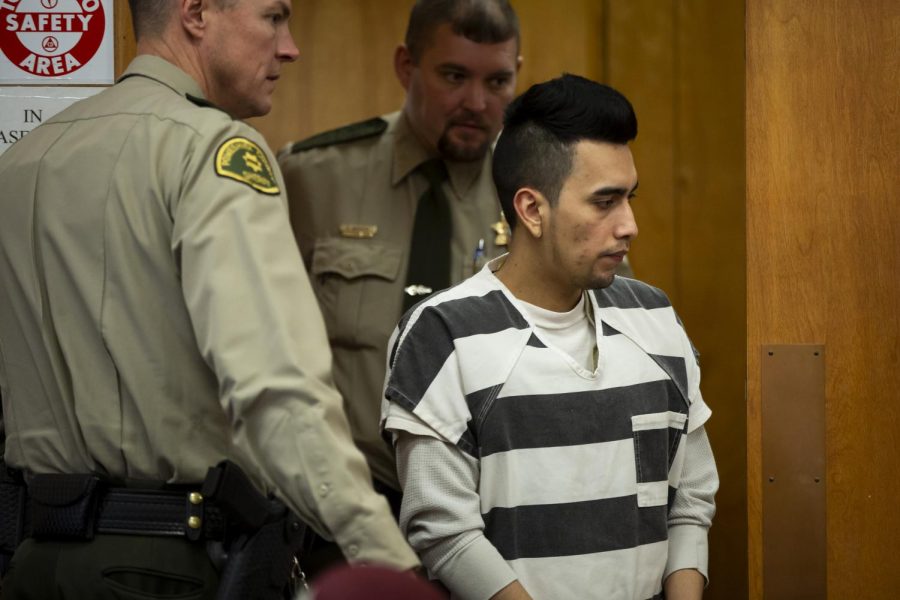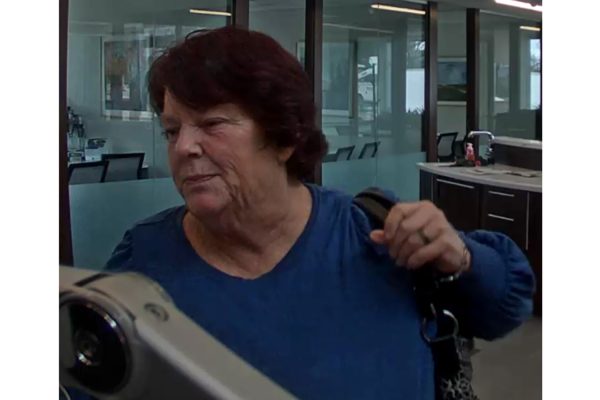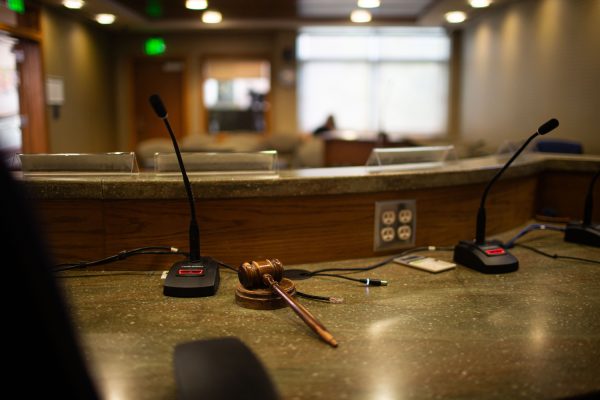‘It’s not going to be pleasant’: Prosecutor warns potential jurors for trial over the death of Mollie Tibbetts
The prosecution warned potential jurors on the first day of the trial that they should expect graphic evidence that will be difficult to hear and see. No jurors have been selected as of Monday.
Cristhian Bahena Rivera appears for an evidence suppression hearing at the Poweshiek County Courthouse on Wednesday, Nov. 13, 2019 in Montezuma. Brian Powers/The Register
May 17, 2021
Editor’s Note: This is a developing story. Check back tomorrow for more updates on the jury selection.
The prosecution and the defense of Cristhian Bahena Rivera are in the process of selecting the jury in the trial over the death of University of Iowa student Mollie Tibbetts, kicking off the first day of the projected 10-day trial.
The prosecution warned the prospective jurors that there will be elements of the case that might be difficult to hear, including graphic evidence in the form of photographs and video, among others.
“We’re going to talk about the violent death of a young girl, Mollie Tibbetts,” prosecutor Scott Brown said. “It’s not going to be pleasant.”
According to Brown, the jury selection process is meant to select fair, impartial jurors. Both the prosecution and defense lawyers are currently trying to narrow down a pool of 175 individuals to 12 jurors and three alternates.
Currently, the jury has not selected any jurors, despite clearing 24 of 34 interviewed jurors for consideration. Of the 10 dismissed, nine said they had already formed an opinion and were dismissed by the prosecution and defense after being questioned in private. The last juror was dismissed because of a lack of child care access.
At least 13 jurors will be questioned on Tuesday. The jury is not seated until every juror has been questioned by both the defense and prosecution.
Bahena Rivera, 24, will stand on trial this week, accused of first-degree murder. If convicted, he will serve life in prison.
Tibbetts, 20, went missing on July 18, 2018. The search ended in August 2018 when Bahena Rivera, 24, led authorities to her body.
As previously reported by The Daily Iowan, Bahena Rivera was employed and resided in Poweshiek County for four to seven years. He was originally from El Guayabillo, Guerrero, Mexico.
Bahena Rivera told investigators he saw Tibbetts running on the evening of July 18, approached her, and started running with her. Tibbetts told him to leave her alone and threatened to call police if he didn’t.
Bahena Rivera told investigators he then blacked out, and said he does not remember anything until he came to an intersection in his car. He realized Tibbetts was in the trunk of his car, and he dragged her into the cornfield. Rivera then led investigators to where her body was. An autopsy found Tibbetts died of multiple sharp force wounds.
During screening questions, the prosecution asked potential jurors about their knowledge of the case and whether or not they had formed an initial opinion regarding any aspect of the case.
Prospective jurors were then asked by the prosecution to give their definition of “burden of proof” and “beyond a reasonable doubt.”
According to Cornell Law, in a criminal case, the “burden of proof” falls upon the prosecution to prove the defendant’s guilt. If the jury has no reasonable doubt that the defendant committed a crime, the jury will deliver a ‘guilty’ verdict. If there is any doubt, the verdict will be “not guilty.”
The prosecution read off a list of potential witnesses that may take the stand in this week’s trial. Among the potential witnesses was Pamela Romero, former Iowa City police officer and current officer in West Liberty.
Two jurors questioned on Monday shared feelings of sympathy for Bahena Rivera. One said she felt the gravity of how “terrible” the events that took place are for both sides.
“It’s a horrible position to be in on both sides,” one of the two jurors said. “…You can’t not feel something for everyone involved.”
The other juror said he felt sorry for Bahena Rivera listening with a translator, as English is not Bahena Rivera’s primary language.
“…It’s supposed to be a jury of your peers,” the juror said. “It doesn’t really look that way.”
While some of the potential jurors mentioned having Hispanic or immigrant relatives, most appeared to be white and spoke English as a primary language.
Defense attorney Chad Frese asked the jurors whether or not Bahena Rivera’s immigration status or his race would affect the juror’s ability to reach a fair and impartial verdict, or whether they believe that should afford him fewer rights in the U.S. court system.
Bahena Rivera’s immigration has been a subject of debate since 2018, when a lawyer said he was working legally but his employer said he was not. It was eventually discovered that Bahena Rivera had provided false information on his employment status.
The trial will continue throughout this week and into next week for a projected 10 days.











